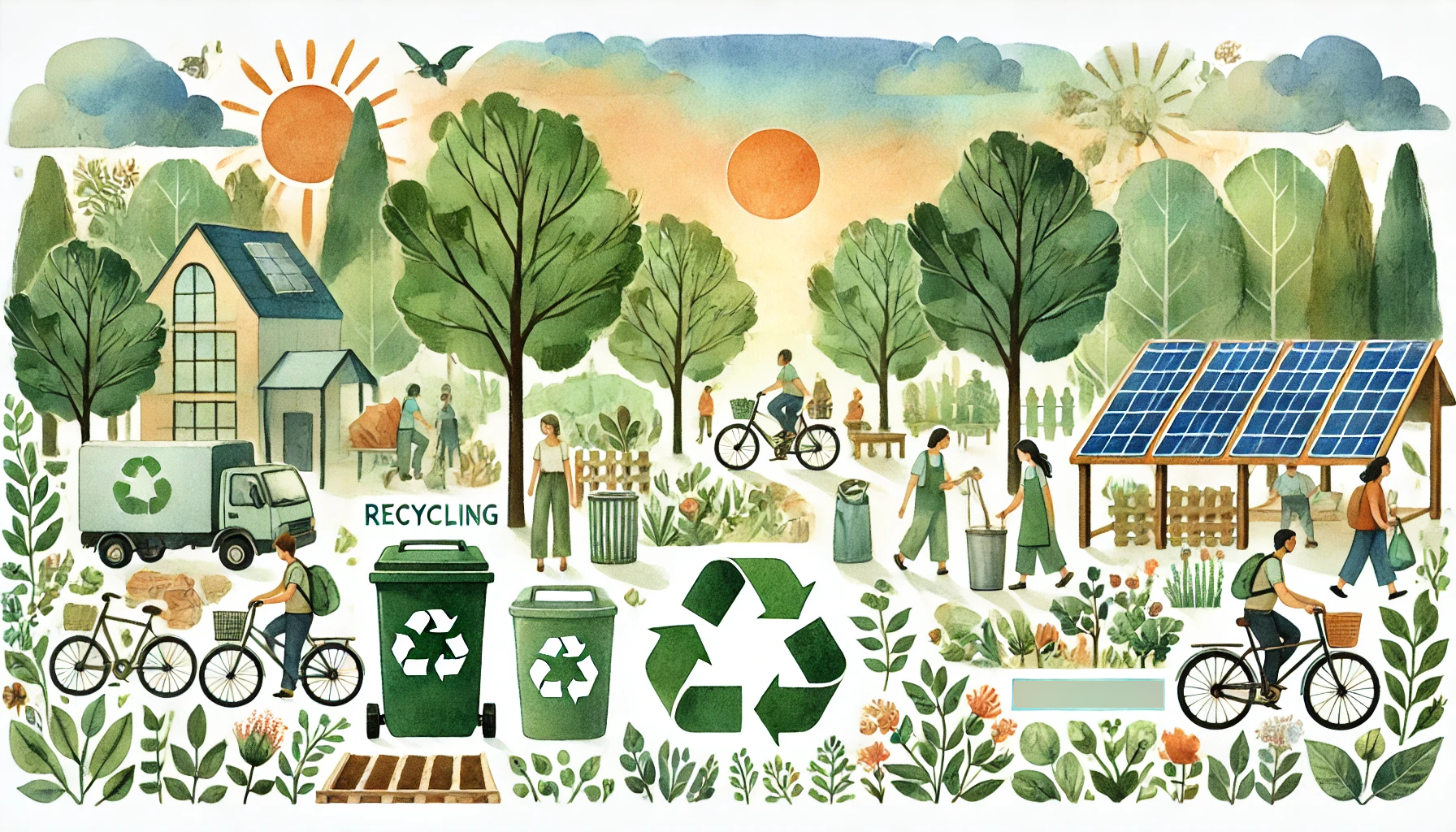Making Small Changes with Big Impacts
Imagine a world where our everyday choices contribute to a healthier planet. Eco-friendly habits may seem like small gestures, but together they add up to create massive environmental benefits. Many are already adopting greener lifestyles by swapping single-use items, conserving energy, and buying sustainably sourced products. These choices are practical, impactful, and surprisingly simple to incorporate into everyday life. From reducing waste to conserving energy, adopting eco-friendly habits doesn’t just benefit the planet but can also bring a sense of purpose and fulfillment to your day.
Table of Contents
Reusable Over Disposable: The Basics of Green Living
One of the easiest places to start on the eco-friendly journey is by choosing reusable items over disposables. This shift alone can reduce a significant amount of waste, and it’s often more economical in the long run.
- Say No to Plastic Bags: Switch to reusable shopping bags, and consider keeping one handy at all times. Many stores even offer discounts for those who bring their bags.
- Opt for Reusable Water Bottles and Coffee Cups: Invest in a quality water bottle and coffee cup, and use them daily. This simple act reduces the use of single-use plastic bottles and disposable cups significantly.
- Reconsider Packaging: Choose products with minimal or eco-friendly packaging. Buying in bulk can reduce packaging waste, and many stores offer zero-waste options where you bring your containers.
These simple changes reduce the reliance on single-use items and contribute to reducing plastic pollution and landfill waste. For more insights on reducing plastic, check out the Plastic Pollution Coalition.
Conscious Choices in Energy Use
Beyond waste reduction, energy conservation plays a significant role in reducing your carbon footprint. Here are some energy-saving habits to adopt:
- Switch to LED Bulbs: LED bulbs use up to 80% less energy than traditional ones and last significantly longer, saving both energy and money.
- Unplug and Power Down: When electronics aren’t in use, unplugging them or using a power strip helps reduce “phantom” energy drain, which occurs even when devices are off.
- Limit Heating and Cooling: Consider setting your thermostat a degree or two lower in winter and higher in summer. Using ceiling fans, proper insulation, and natural ventilation can also help reduce energy consumption.
Making mindful energy choices reduces greenhouse gas emissions and supports cleaner air for everyone.
Supporting Sustainable and Local Products
Every purchase is a vote for the type of world you want to live in. Choosing sustainably sourced or locally produced goods can be an impactful habit:
- Prioritize Local Produce: Buying local foods not only supports small farmers but also reduces the carbon emissions linked to transporting goods long distances.
- Opt for Ethical and Eco-Friendly Brands: Look for certifications such as Fair Trade, Rainforest Alliance, or B-Corp. These standards help ensure that products are made sustainably and ethically.
- Reduce Animal Product Consumption: While going entirely plant-based isn’t for everyone, reducing animal products is beneficial for the environment. Even adopting a plant-based meal once a week (like Meatless Mondays) can help reduce greenhouse gas emissions.
Water Conservation Made Simple
Water is a precious resource, and small changes in our routines can make a big difference in conserving it.
- Shorten Shower Time: Reducing shower time by just a few minutes can save gallons of water per day. Consider using a timer or switching to a low-flow showerhead for additional savings.
- Fix Leaks: A leaking faucet can waste gallons of water each day. Regularly check for leaks in your home, and make repairs promptly.
- Reclaim and Reuse Water: Collecting rainwater for plants or reusing the leftover water from rinsing produce can further reduce water waste.
By being conscious of water usage, we protect valuable freshwater resources and reduce strain on water treatment systems.
Recycling and Composting for Zero Waste
Proper waste management is key to an eco-friendly lifestyle. Recycling and composting help reduce landfill waste, which, in turn, reduces methane emissions.
- Know Your Local Recycling Rules: Every area has different recycling capabilities, so familiarize yourself with what materials your local facility can accept.
- Composting Organic Waste: Composting transforms kitchen scraps into nutrient-rich soil for plants and gardens. Many composting systems suit small spaces, making this an achievable goal for most households.
- Upcycle or Donate: Consider giving items a second life by repurposing or donating them. From clothing to furniture, secondhand shopping or creative upcycling can reduce waste and save money.
Recycling and composting can become fulfilling eco-friendly habits, helping us feel connected to the circular life cycle of materials.
Sustainable Transportation
Transportation is a major contributor to greenhouse gas emissions, but there are ways to minimize its impact.
- Walk or Bike: Whenever possible, walking or biking to your destination is a healthy, eco-friendly option. It reduces emissions and promotes physical well-being.
- Use Public Transportation: Public transit options are more energy-efficient per person than driving, making them a great eco-conscious choice.
- Carpool: Sharing rides with others reduces fuel consumption and the number of vehicles on the road, contributing to less traffic and pollution.
Transitioning to greener transportation options is a powerful way to reduce emissions and contribute to cleaner air in your community.
Finding Joy in Eco-Friendly Living
Adopting eco-friendly habits doesn’t have to be overwhelming. By gradually introducing small changes, anyone can lead a greener, more sustainable lifestyle. Each positive choice not only benefits the planet but often brings new joy and satisfaction into daily life. Remember, it’s not about being perfect but rather making progress. Together, these small efforts can create a significant and lasting impact on the health of our planet.
References:
Tags: Climate Change, Conscious Consumption, Daily Habits, Eco-Conscious, Eco-Friendly Habits, Environmental Awareness, Green Practices, Reduce Waste, Renewable Resources, Sustainable Living
